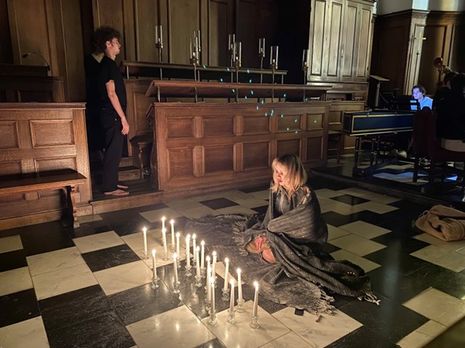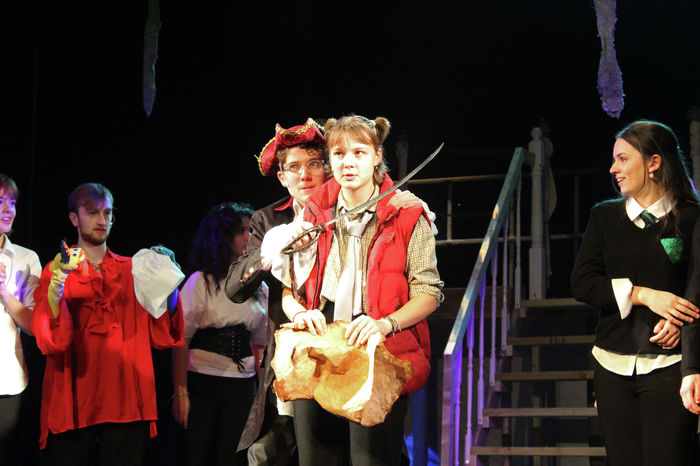Dido and Aeneas radically reimagined
Innovative direction and experimental stagecraft bring this classical opera to life in Clare college chapel

In popular culture’s imagination, opera has become theatre’s posher, richer and stuffier older sister. Traditional, tight-lipped and archaic, for most of us it is a genre that is rapidly gathering dust. Tickets to send our grandparents’ way rather than eagerly buy ourselves. Of course, we are forgetting opera’s power to fight back against our prejudices, to be that rebellious and trouble-making teenager.
Let’s remember Stravinsky’s The Rite of Spring – a piece so powerful that it caused a riot on its opening night in May 1913. Nijinsky, its technically astute choreographer, directed the ballet’s dancers to resist fluent movement and instead jerk awkwardly. Dissonant music, uncomfortable movement and a primitive aesthetic style heralded an operatic approach that had never been seen before. It was none of the anachronistic adjectives I used above – it violently shakes the dust off.
The directors of Clare College Chapel’s Dido and Aeneas, who are set to put on another opera this Lent term, seem to me to take after the radical voices of Stravinsky and Nijinsky. Josh Herberg, director, and Luca Zucchi, musical director, capitalise on our preconceptions of what an opera should look like, only to undermine and reject them.
“[The directors] capitalise on our preconceptions of what an opera should look like, only to undermine and reject them.”
In the traditional Homeric Dido and Aeneas, Dido is only a stepping-stone in Aeneas’s heroic story and a mere catalyst in the wars between Rome and Carthage. Reimagined and retold by this emerging directorial partnership, Dido is given her main character moment. We follow her as she falls in love, is abandoned and, subsequently, dies of heartbreak.
In the main role, Hannah Dienes Williams carries the cast, singing as effortlessly as if she were speaking. Her sorrow maintains a subtle strength throughout the piece and, although Dido will eventually die for him, she never lets her character be defined by Aeneas. The strength of the performance is in its individuality, taking back her story and telling it in her own words. It is not unfeminist to be in love. Nor is it unfeminist to be heartbroken. It is empowering to own it.
Aeneas, played by PhD student Tom Unwin, is all muscle, beard and machismo. Rugged in voice and appearance, he serves the perfect counterpart to Dido’s aggressive femininity. A sixty second section in which the word “soft” is sung repeatedly emasculates Aeneas’s homemade spear.
“[They were] always just one mistake away from the chapel going up in flames”
At first sight, the sacred space of the chapel is a stereotypically serious atmosphere for such an epic genre. But, rest assured, Herberg and Zucchi have no intentions of tiptoeing around it. They adorn their mythical protagonists in primitive straw sacks, influenced by Grotowski’s ‘poor theatre’ aesthetic – an unconventional approach in theatre, an almost unheard of approach in opera. Instead of looking glamorous and lavish, as her royal status might suggest, the Queen of Carthage looks bare and demoralised. Colourful, geometric shapes are painted on the sacks and stand out against the stained glass windows of the chapel: modernist expressionism contrasted against more traditional artforms and architecture. Finally, a horde of candles that beautifully light the stage threaten the flammable sacks, so we’re always just one mistake away from the chapel going up in flames.
Perhaps one missed opportunity in this otherwise outstanding production is the chorus. The array of singers remain oddly alien from the protagonists, standing to the side like funeral goers or pallbearers as Dido sings herself to death. Alternate interpretations could have pushed the production a step further with a Midsommar-esque scene of collective grief. Imagine a crowd crying with Dido, lamenting alongside her, as appendages to her larger-than-life stage presence. Imagine crying with her for how long her voice has been sidelined. This would shock the heartstrings rather than just tugging on them. As it happens, the musical director’s animated and expressive conductorial style is more sympathetic to Dido’s distress, as he pulls the orchestra in different emotional directions.
Ultimately, this opera is not anything that you would expect an opera to be. It is the promising expression of an exciting and experimental new directorial partnership, and I cannot wait to see what they do with The Man Who Mistook His Wife for a Hat, coming to the stage in Cambridge this Lent.
 News / Right-wing billionaire Peter Thiel gives ‘antichrist’ lecture in Cambridge6 February 2026
News / Right-wing billionaire Peter Thiel gives ‘antichrist’ lecture in Cambridge6 February 2026 News / Cambridge students uncover possible execution pit9 February 2026
News / Cambridge students uncover possible execution pit9 February 2026 News / Epstein contacted Cambridge academics about research funding6 February 2026
News / Epstein contacted Cambridge academics about research funding6 February 2026 News / Man pleads guility to arson at Catz8 February 2026
News / Man pleads guility to arson at Catz8 February 2026 News / John’s duped into £10m overspend6 February 2026
News / John’s duped into £10m overspend6 February 2026










